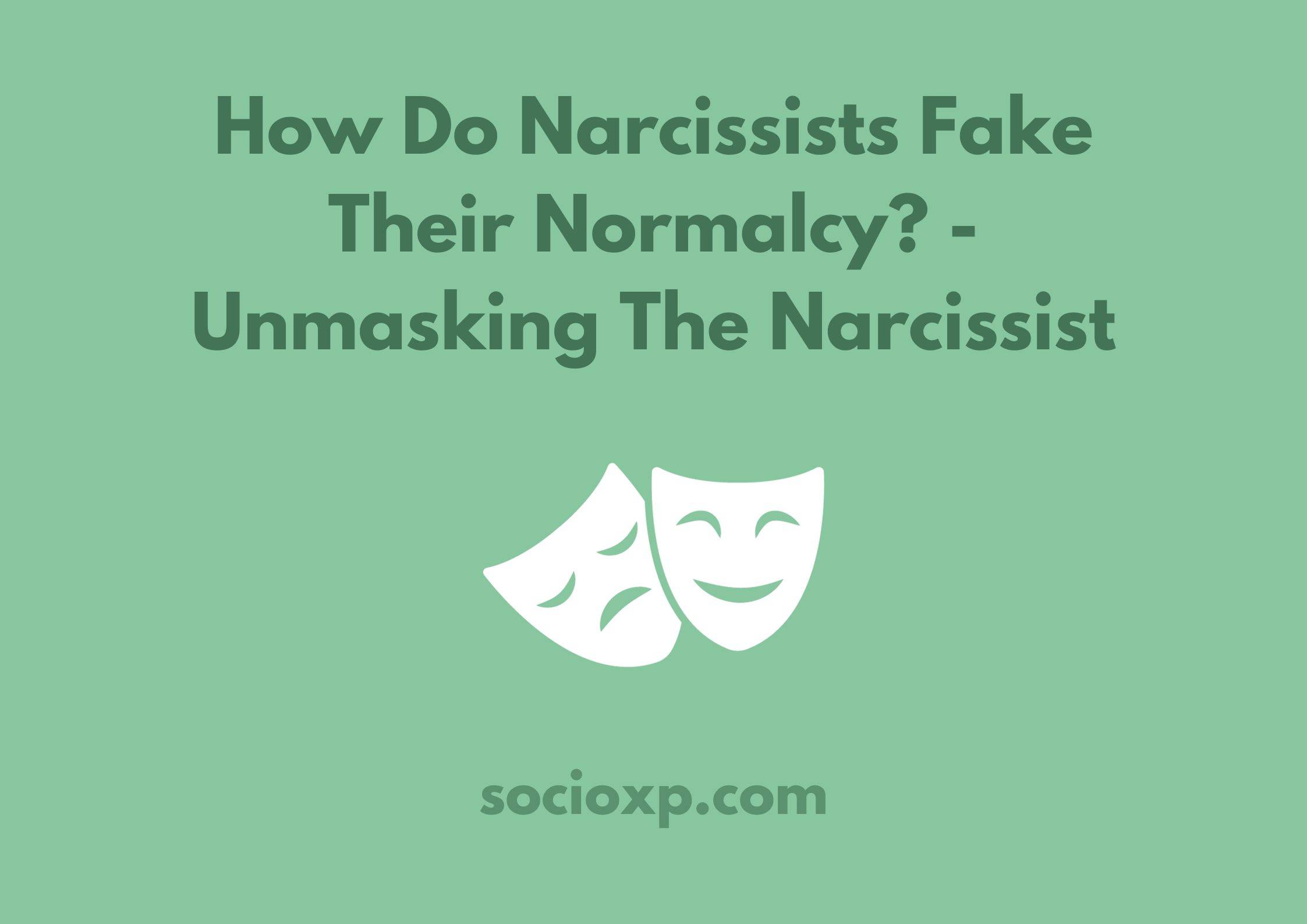How To Respond To A Narcissist’s Fake Apology? (Impactful Response)
How to Respond to a Narcissist’s Fake Apology? Can a narcissist’s apology be genuine? Or are their apologies fake? It can be an awkward situation when a narcissist apologizes, as you are perplexed as to how to perceive their apology, also can they be trusted, are their apologies fake or accurate, and whatnot.
Narcissism is associated with an inflated sense of self-importance, always seeking admiration, adoration, and validation from people. They persistently manipulate people, take utter advantage of them, abuse them for their well-being and torture them with toxic behavior around the clock.
But also not all narcissists are the same. The personality of each narcissistic individual varies due to the varying degree of narcissism. So generalizing everything for everyone would be unfair to them. Some narcissists can feel apologetic and might apologize genuinely too. But this tendency is found in very few cases where a narcissist is genuine with remorse. Narcissists are typically called out for their fakeness, ingenuity, and phony behavior.

Narcissistic apologies always may feel like a big annoyance, as they always just try to shut down their big mistakes where they have hurt you immensely. They have broken you emotionally and given you a trauma worth of a lifetime and all they try to do is conceal everything with just a mere sorry which does not even feel genuine. A person’s apology can often be recognized from the way they behave after apologizing.
A genuine apology is not described just through mere words but also can be noted in the behavior by not repeating the same mistakes on a loop. But with narcissists, it is totally different, they would apologize just to repeat everything the next day itself. They just try to cover up and conceal their wrongdoings and hurt things just mere words. Their apology feels like putting a small bandage over a fractured arm. It can feel that ingenuine.
To understand and recognize fake apologies, first, you need to know and understand what a genuine apology may look like. So let us know more about what a genuine apology,
What does an authentic apology look like?
A genuine apology clearly reflects acknowledgment and the presence of guilt in their behavior. It is clearly demonstrated in the wrongdoer’s behavior as they may be remorseful and regretful regarding their mistake and all the hurt they caused.
The wrongdoer would empathize with the victim, and thus empathy may clearly be visible in their apology. The wrongdoer might be able to validate the victim’s feelings and would also be able to understand the level of pain that they caused.
Authentic apologies are a form of mirrored willingness to change genuinely and never repeat the similar.
Genuine apologies include taking complete responsibility for the mistakes and hurt caused. Also, there is no blame-shifting or playing the victim.
Authentic apologies are clear acknowledgment of what was specifically wrong, and what mistakes hurt others with a true understanding of the actions of the wrongdoer.
Genuine apologies also include reassurance of never repeating the mistake, rectifications, and making amends to make the other person feel comfortable. Rectifying the mistake can take away some pain from the pain bearer.
Fake apologies include statements that ensure that the boundaries of other people are not damaged.
Fake apologies are not rushed. They allow time for the other person to heal, also re-establish trust, and also provide space.
What is a Fake apology?
A fake apology is an act of feeling nonremorseful for one’s action yet apologizing just for the sake of doing that. It is an apology that feels ingenuine and insincere. Fake apologies are used to conceal one’s mistakes and also not take any responsibility for them. It is also used to run away from confessing one’s fault and also oversee the hurt they have caused others. A fake apology lacks empathy, true feelings of remorse, and also any wishfulness to change. It is an easy way to deflect the blame, intentionally running away from the mistakes, and causing greater harm without any realization.

How do you recognize fake Apologies?
There are a few typical statements that begin like,
A sentence containing a “BUT”. If an apology contains, “I am regretful for doing something like this, but…..” then that preposition “but” immediately invalidates the apology. Hence it indicates insincerity.
If an apology sounds something like, “I am sorry if you cannot…..” it is conveyed that the hurt that they have caused is nothing much and the person who has been a victim of their hurtful behavior is just exaggerating the situation.
If the apology sentence includes something like, “Because of you”, then it clearly is blameshifting and the person who is apologizing is not at all genuinely apologizing. It is all blame-shifting and playing the victim situation here.
How to Respond To A Narcissist’s Fake Apology?
Responding to fake apologies can be stressful and hurting when you are specifically aware that the apology is ingenuine. So how should you deal with a narcissist’s fake apology?
1. Recognizing the signs of a fake or poor apology
Knowing the difference between a fake and a genuine apology can help you recognize fake apologies quickly. Narciistss, when they try to apologize, it is not even genuine many a times and is just one of their manipulative tactics. It is not necessary that their entire apology be fake, some parts can be authentic but some may be ingenuine. It is your job to figure out the fakeness of the apology and find to work with it. Try to process the words, try to relate the authenticity of their words, and move on further with caution as there might be a mix of partial truths and big lies in their apology.
2. Letting them know that you are disappointed in them
When you feel that your relationship with the narcissist is important, then getting an apology or just acknowledging the mistake may feel good for you. So try to be firm yet gentle and let them know with an open mind that their behavior hurt you and that you had not expected such behavior from them, thus you are disappointed with them. But the key technique here is not highlighting their mistake much, yet asking for an apology.

Try to be less defensive and more forward with your apology. As targetting a narcissist’s mistake may look like you are targetting their grandiose image and doubting their perfect image, they might get furious rather than apologizing. So if your request seems defensive to them, then you should forget the apology and be ready to face their rage or rude behavior. Respecting your feelings and being clear but gentle with the narcissist works best here.
3. Setting boundaries to protect yourself
Narcissists are not good at maintaining boundaries. So enforcing clear boundaries may help you a lot to protect yourself. When a narcissist crosses the line by making a mistake, expect them to repeat the same. Thus enforcing boundaries along with the consequences if broken, may help you to establish stronger boundaries. Setting boundaries can help you maintain your emotional well-being in the first place. It is not possible entirely to stop the narcissist from making mistakes and hurting but establishing boundaries can ease the process.
Setting boundaries means clearly discussing about what behavior is acceptable and what is not. Stick to your boundaries and do not let them manipulate you. Setting boundaries can help you in saving a lot of time, energy, and mental health. This can ensure that you remain unaffected by their behavior and protect your mental health. Narcissists tend to cross boundaries endlessly, thus being firm and holding up your limits is the best way you can protect yourself from their false accusations.
4. Setting expectations from the narcissist
Everyone expects something from their relationships, so being clear yourself about the type of relationship you want and deserve becomes crucial. So ask yourself about your own expectations and what you expect from your narcissistic partner and writing them down can be helpful here to establish a healthy relationship.
Do not expect too much from the narcissist as they hardly understand anything about the meaning of relationships. All they know is how to receive but nothing about how to give. Do not expect love, affirmations, and such positive things from the narcissist. But what you can do is draw boundaries, make yourself less accessible, and maintain your expectations in order to not hurt yourself more from the toxic relationship.
5. Not falling for a Narcisist’s manipulative trap
Narcissists are highly manipulative and they use apologies to guilt-trip the victims and make them feel terrible. They achieve what they want by fake apologizing. So try to be less accessible to them, do not let go of their mistakes that easily, and do not fall for their manipulative trap of fake apologizing and getting away with the mistake that easily.
6. Calling them out on their insincere apologies
When you recognize their fake apologies, the first thing you want to do is point out how fake the narcissist is and also their apologies. Confronting the narcissist and allowing them to know that you are well aware of their false apologies and that you can see right through them. This way the narcissist would think twice before manipulating you in the future.
7. Understanding narcissism and knowing more about your partner
Narcissists are often characterized by their boosted sense of self-importance, self-pride, and self-needs. With a narcissist, everything is just about them. Narcissists thrive upon the attention, adoration, and validation that they receive from others, and what makes them distinguished from others is the way they think and the way they behave, which is totally selfish and mean.
A narcissist finds it really difficult to accept any sort of criticism. They hardly can take any sort of feedback, so criticism is not their strong pursuit. They might be enraged when someone criticizes them as they think criticism is a direct attack on their self-belief of being perfect and superior beings.

8. Keeping yourself safe from the toxic narcissist and their fake apology
Being in a relationship with a narcissist requires a lot of patience, tolerance, and empathy. Being with them is challenging on many levels and there are many reasons why dealing with a narcissist is so difficult. Narcissists have a tendency to manipulate everyone associated with them and thus it becomes a tedious task to deal with them. One such manipulation tactic is fake apologizing; and if that does workout out, then they use the withdrawal technique to save themselves from the blame.
So it becomes crucial here to protect yourself and your emotional well-being at all costs. Draw clear boundaries, do not give in, and also do not allow the narcissist to break them and confront the narcissist from time to time that you can see right through them and their manipulative behavior and if they do not cease there, they might face some serious consequences.
Why would a narcissist apologize if they cannot accept their fault?
Narcissists hardly can accept the fact that they are at fault, yet why do they apologize? There are a few reasons for that.
- They try to appear humble and compassionate and this is also one of their manipulative tactic to lure in attention by apologizing publically.
- They wish to maintain their control over you so they might fake apologize to not lose their grip over you.
- A narcissist might not know the true nature of genuine apologies but they do know when you are pissed with them, So just to gain the admiration back, they tend to provide a half-hearted or ungenuine apology.

What to do if a Narcissist does not apologize for their mistakes?
It is really a task for a narcissist to accept their fault, be responsible for their actions that caused harm to others, and let their guard down. They always think that they are perfect and cannot let anything harm their perfectly crafted image. So what to do when a narcissist does not apologize for their mistake?
It is normal to feel agitated, frustrated and hurt when someone just ignores their fault and makes it look like nothing is wrong and the other person is merely exaggerating. Know and validate your hurtful emotions and work on them.
Establish strict boundaries and also acknowledge the narcissist that if the boundaries are broken then there might be severe consequences.
The best way to overcome or heal from some traumatic experience is to let go of the bitter, toxic, and leftover feelings. Working on self-care and taking care of one’s well-being is the biggest way to support oneself to overcome traumatic experiences.
If the severity of mistakes keeps on increasing with utmost negativity then evaluate your options and choose to end the relationship as a means to protect your well-being.
Seeking support from friends, family or even mental health can be useful in such situations.
In Conclusion
Going through a narcissistic fake apology can be draining both emotionally and mentally. But there are a few ways that are mentioned above and which can help you get through the narcissist’s fake apologies. So believe in yourself, validate yourself, choose your mental and emotional well-being, work on self-care, consider your options, and lastly protect yourself at all costs. Work on healing yourself from traumatic experiences.
- How To Make A Narcissist Discard You And Leave You Alone? - March 21, 2024
- Narcissistic Supply: 9 Signs You May Be Someone’s Narcissistic Supply - March 11, 2024
- Narcissistic Abuse And Anxiety – 11 Symptoms of Narcissistic abuse-induced anxiety - March 9, 2024


